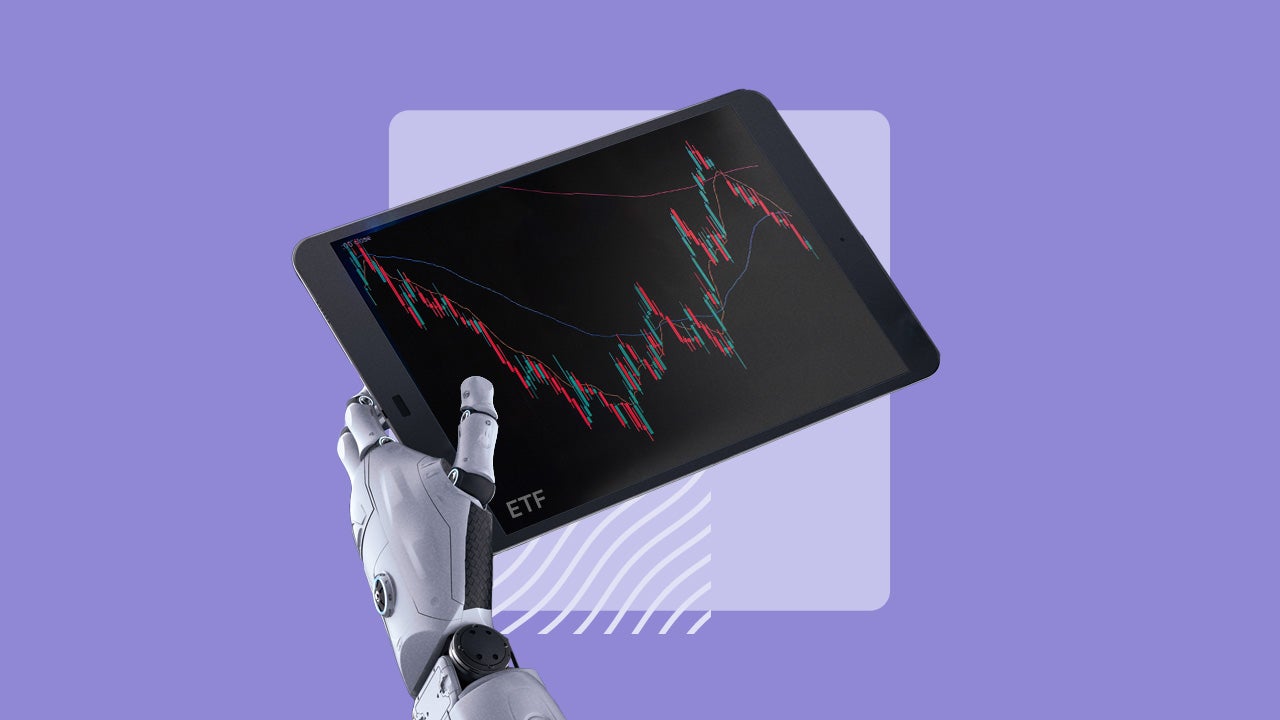PhonlamaiPhoto/Getty Images; Illustration by Issiah Davis/Bankrate
The artificial intelligence (AI) boom has investors wondering how they can benefit from what some experts believe is the next revolutionary technology. AI has the potential to drastically change how we live and work on a daily basis.
AI ETFs are one of the simplest ways investors can participate in the growing artificial intelligence industry. Here are some top AI ETFs to consider for your portfolio.
Top AI ETFs
*Data as of Oct. 23, 2024.
iShares Future AI and Tech ETF (ARTY)
This ETF aims to track the results of an index made up of U.S. and non-U.S. companies that could benefit from growth in artificial intelligence. The fund holds about 50 companies and has roughly 42 percent of its assets in its top 10 holdings.
- 1-year return: 20.6 percent
- Expense ratio: 0.47 percent
- Assets: $614.1 million
- Top holdings: Nvidia (NVDA), Broadcom (AVGO), Super Micro Computer (SMCI) and Advanced Micro Devices (AMD)
Global X Robotics and Artificial Intelligence ETF (BOTZ)
This fund invests in companies that could benefit from increased adoption of robotics and AI, including companies involved in industrial robotics and automation, non-industrial robots and autonomous vehicles. The fund holds more than 40 companies and has about 66 percent of its assets in the top 10 holdings.
- 1-year return: 34.6 percent
- Expense ratio: 0.68 percent
- Assets: $2.5 billion
- Top holdings: ABB Ltd. (ABBN), Nvidia (NVDA), Intuitive Surgical (ISRG) and Keyence Corp (KYCCF)
Global X Artificial Intelligence and Technology ETF (AIQ)
This ETF invests in companies that could benefit from the development and utilization of AI technology in their products and services and in companies that provide hardware that facilitates the use of AI for the analysis of big data. The fund holds more than 80 companies and has about 34 percent of its assets in the top 10 holdings.
- 1-year return: 41.0 percent
- Expense ratio: 0.68 percent
- Assets: $2.2 billion
- Top holdings: Alibaba Group (BABA), International Business Machines (IBM), Oracle (ORCL) and Cisco Systems (CSCO)
WisdomTree Artificial Intelligence and Innovation ETF (WTAI)
This fund aims to track the investment performance of an index composed of companies that are involved in the theme of AI and innovation. The ETF holds about 75 companies and has around 25 percent of its assets in the top 10 holdings.
- 1-year return: 22.2 percent
- Expense ratio: 0.45 percent
- Assets: $196.9 million
- Top holdings: Arm Holdings (ARM), Nvidia (NVDA), Meta Platforms (META) and Taiwan Semiconductor Manufacturing Co (TSM)
Invesco AI and Next Gen Software ETF (IGPT)
This ETF is based on the STOXX World AC NexGen Software Development Index, which is made up of companies exposed to technologies or products that contribute to future software development. The fund holds around 100 companies and has about 59 percent of its assets in the top 10 holdings.
- 1-year return: 41.5 percent
- Expense ratio: 0.58 percent
- Assets: $391.0 million
- Top holdings: Nvidia (NVDA), Alphabet (GOOGL), Meta Platforms (META) and Advanced Micro Devices (AMD)
What are AI ETFs?
Artificial intelligence ETFs hold the stocks of many different companies involved in various aspects of the AI industry. By investing in a basket of stocks, ETFs generally come with less risk than holding just a few individual stocks.
The stocks held in AI ETFs may include some of the largest tech companies in the world such as Microsoft, Alphabet or Nvidia. While some of these stocks have performed phenomenally well in recent years, the performance of an AI ETF will depend on the underlying stocks it holds and how much the fund has allocated toward the top performers.
Editorial Disclaimer: All investors are advised to conduct their own independent research into investment strategies before making an investment decision. In addition, investors are advised that past investment product performance is no guarantee of future price appreciation.
Read the full article here


















